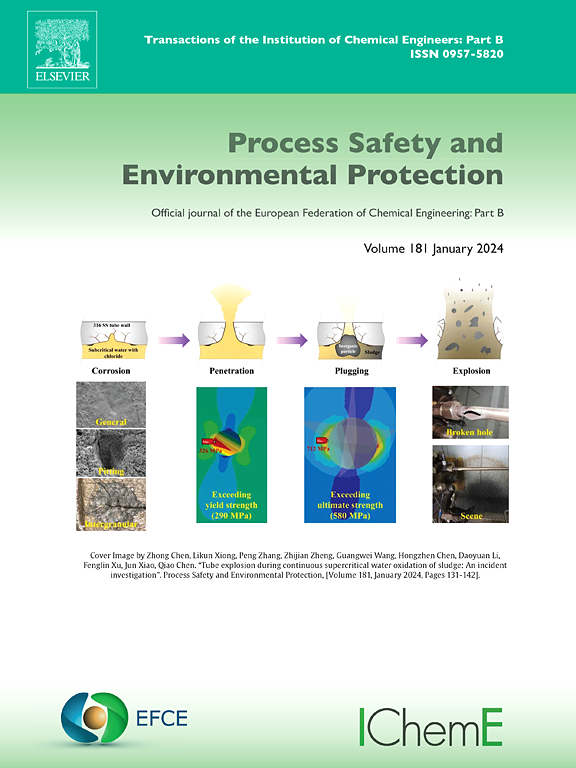Evaluation of climate intervention technologies for sustaining cities close to oil and gas operations: A sustainability and feasibility-based decision support system under molecular fuzzy set
IF 7.8
2区 环境科学与生态学
Q1 ENGINEERING, CHEMICAL
引用次数: 0
Abstract
As cities universally grapple with exacerbating challenges from environmental extremes such as wildfires, heat waves, air pollution, climate change, and carbon dioxide (CO2) emissions, there is an urgent need for a decision support system (DSS) to provide actionable insights for policymakers and plan the mitigation of the adverse impacts of these extremes on communities. In this regard, climate intervention technologies are important and valuable technologies for sustaining cities under environmental extremes. Assessing these technologies for use as an optimal alternative is urgently needed in most of Iran's southern regions due to the proximity of cities in these regions to oil, gas, and petrochemical systems. According to, in order to optimize the use of these technologies for the studied regions, an intelligent DSS based on a systematic model, namely the Delphi-fuzzy molecular ranking (DFMORAN) model is conducted by considering the sustainability and feasibility principles of different climate intervention technologies. For implementing the DEFMORAN model, ten climate intervention technologies consisting of 1) stratospheric aerosol injection (SAI), 2) space-based geo-engineering (SBG), 3) marine cloud brightening (MCB), 4) direct air capture with carbon storage (DACCS), 5) enhanced weathering, 6) biochar, 7) afforestation and reforestation (AR), 8) bioenergy with carbon capture and storage (BECCS), 9) soil carbon sequestration (SCS), 10) marine biomass and blue carbon (MBBC) are considered as decision-making alternatives. Also, an evaluation system containing 17 criteria-based sustainability and feasibility principles (economic, environmental, social, and feasibility aspects) is used. The results of this model reveal that the AR and SCS with the highest rank are proposed as the sustainable and optimal alternatives for mitigating the environmental extremes and conserving the ecosystem of the studied cities in Iran.
基于分子模糊集的可持续性和可行性决策支持系统的油气周边可持续城市气候干预技术评价
随着城市普遍努力应对野火、热浪、空气污染、气候变化和二氧化碳(CO2)排放等极端环境带来的日益严峻的挑战,迫切需要一个决策支持系统(DSS),为政策制定者提供可操作的见解,并规划减轻这些极端环境对社区的不利影响。在这方面,气候干预技术是在极端环境下维持城市的重要和有价值的技术。由于伊朗南部大部分地区的城市靠近石油、天然气和石化系统,因此迫切需要评估这些技术作为最佳替代方案的使用。为优化研究区气候干预技术的利用,综合考虑不同气候干预技术的可持续性和可行性原则,建立了基于德尔菲-模糊分子排序(DFMORAN)模型的智能决策支持系统。为实现DEFMORAN模型,采用了10种气候干预技术,包括:1)平流层气溶胶注入(SAI)、2)天基地球工程(SBG)、3)海洋云增亮(MCB)、4)直接空气捕获与碳储存(DACCS)、5)增强风化、6)生物炭、7)造林与再造林(AR)、8)生物能源与碳捕获与储存(BECCS)、9)土壤碳封存(SCS)、10)考虑海洋生物质和蓝碳(MBBC)作为决策选择。此外,还使用了一个包含17个基于可持续性和可行性原则(经济、环境、社会和可行性方面)的评价系统。该模型的结果表明,最高等级的AR和SCS被认为是缓解伊朗研究城市极端环境和保护生态系统的可持续和最佳选择。
本文章由计算机程序翻译,如有差异,请以英文原文为准。
求助全文
约1分钟内获得全文
求助全文
来源期刊

Process Safety and Environmental Protection
环境科学-工程:化工
CiteScore
11.40
自引率
15.40%
发文量
929
审稿时长
8.0 months
期刊介绍:
The Process Safety and Environmental Protection (PSEP) journal is a leading international publication that focuses on the publication of high-quality, original research papers in the field of engineering, specifically those related to the safety of industrial processes and environmental protection. The journal encourages submissions that present new developments in safety and environmental aspects, particularly those that show how research findings can be applied in process engineering design and practice.
PSEP is particularly interested in research that brings fresh perspectives to established engineering principles, identifies unsolved problems, or suggests directions for future research. The journal also values contributions that push the boundaries of traditional engineering and welcomes multidisciplinary papers.
PSEP's articles are abstracted and indexed by a range of databases and services, which helps to ensure that the journal's research is accessible and recognized in the academic and professional communities. These databases include ANTE, Chemical Abstracts, Chemical Hazards in Industry, Current Contents, Elsevier Engineering Information database, Pascal Francis, Web of Science, Scopus, Engineering Information Database EnCompass LIT (Elsevier), and INSPEC. This wide coverage facilitates the dissemination of the journal's content to a global audience interested in process safety and environmental engineering.
 求助内容:
求助内容: 应助结果提醒方式:
应助结果提醒方式:


